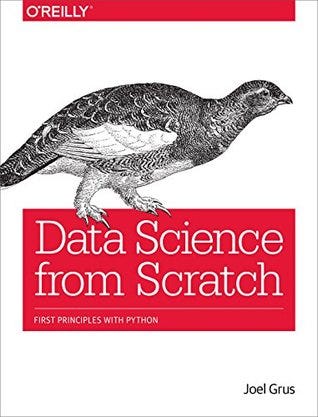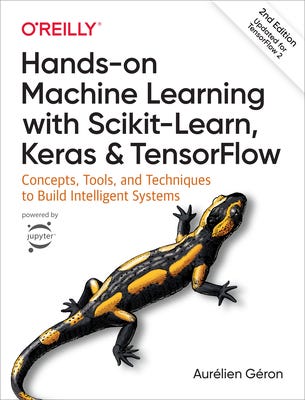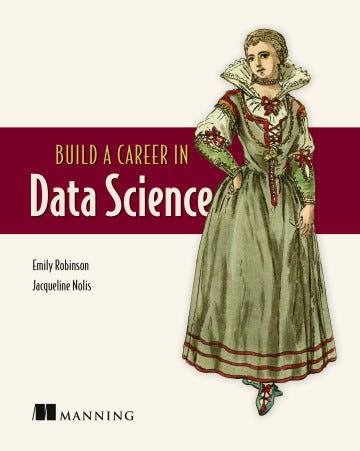The 3 Must-Read Data Science Books for Absolute Beginners
“I’m overwhelmed with all the resources available; what should I do?”

“There are plenty of resources, and I’m confused if I’m on the right path. Could you please help me out?” She worriedly informed.
Things took a sharp turn when I heard these lines from one of my mentees, who has been doing so well thus far. I couldn’t believe even she doubted herself.
To give you context, I’m a senior data scientist, and in my free time, I mentor data enthusiasts to break into the field of data science. I look forward to these interactions as they give me a sense of what problems are faced by beginners and how I can help better.
I have been writing about learnings for you to copy, mistakes for you to avoid, and extensive guides for you to follow— but I’ve missed focusing on the simplest elements to get started in data science.
It’s time educators, and mentors like me own up to it — it’s our job to make it simple and easy for you. It’s our duty to reduce information overload and help you take action.
What good can 52-week roadmaps, 25 resource sheets, 7 cheat sheets, 101 page PDFs do if you’re overwhelmed, end up overthinking, and take no action at all?
In that light, I’m simplifying the process to get you started in data science and machine learning. Online courses and books are truly the building blocks.
Having covered the simplified edition of must-learn online courses earlier, in this article, I’d present you with the books you must read and learn to advance in data science.
Finally, I’d reveal the undeniable key to success in data science. (Spoiler: you probably know it already, but I’d repeat it for you.)
Let’s dive in, shall we?
1. Data Science From Scratch by Joel Grus

I’m so glad I’d found this book in my early days. I don’t think anyone else will walk you through all the fundamental steps in data science in the simplest possible way like Joel does.
Joel takes an interesting approach, where you’re hired as the lead data scientist at a hypothetical social network called DataSciencester. And throughout the book, he’ll help you solve all the problems you’d encounter at work. I loved this unconventional approach. What can I say?
The book has all the concepts you need as a data scientist, from programming to statistics to probability to Big data, with code examples. If you’re a beginner data scientist, this is the book you need to own and read.
I highly recommend you keep this book as your learning guide in your early days.
2. Hands-On Machine Learning with Scikit-Learn, Keras, and TensorFlow by Aurélien Géron

Once you’ve grabbed the data science basics, the 2nd book you’d benefit from the most is the masterpiece written by Aurelien. It’s the most popular machine learning book, everyone recommends. And it didn’t disappoint me.
I’m reading this book for the past 2 years, and I haven’t still finished it. No, It’s not because I’m a slow reader. I use the contents of this book directly in my day-to-day work.
When working on projects, you’ll inevitably hear algorithms like random forests and support vector machines. You’ll find code snippets from scikit-learn as well. Instead of blindly copying them into your project, go open this book and move to the chapter that explains the algorithm you’re about to use.
The book covers the theory and the usage behind every machine learning algorithm. You’ll feel much more confident now because you understand everything that goes behind your models. There’s even advanced content like autoencoders, reinforcement learning, and whatnot.
Don’t be in a hurry to finish the book; keep this as reference material for every single project you’d be working on.
3. Build a Career in Data Science by Emily Robinson and Jacqueline Nolis

This one’s quite different from the other two books we talked about earlier, mostly focusing on the technical stuff related to learning data science. Published in 2020, this one teaches you how to the data science industry works. And that’s why it’s a must-read.
Emily and Jacqueline take us through a ride, starting from deciding if a data science career is for us to different types of data science jobs in the market and the end-to-end process of getting a job.
For example, the 60% rule can help you decide which jobs you qualify and should apply to. That’s right — the book covers ideally everything on what you’ll need to become a data scientist.
What I loved the most was the fact that it doesn’t stop there. There’s a lot of advice for people like me who already have the job to settle and grow in our data science role.
By now, I have reread this book multiple times based on what level I’m on my data science journey. I can tell the authors had done extensive research to write this book with experts on multiple domains and companies. Keep this book as your career guide.
So, that’s it. You know the books you’ll ever need.
There’s one last key step left which I’m about to spell out for you.
The Un-deniable Key to Data Science Success is Something You Already Know
Spend a few moments and think this. What could this be?
It’s not discussing arguing over Python vs. R or binge-watching data science videos on YouTube or enrolling in courses one after the other.
The key is to take action consistently.
No, honestly, think about it. There are definitely other great books and courses on data science, and the reason you’re overwhelmed is because of the information overload these options bring you.
Would you spend more time thinking and planning about acquiring the skill, or would you rather pick one of those I’ve recommended and get started?
You know the answer; I’m just repeating it for you. Whenever someone tries to confuse you, remember this: there are multiple paths to succeed in data science, and the path you choose should be simple enough to help you take action.
This one definitely will.
So let’s start today. And, if you’re stuck, please feel free to reach out — I’m more than happy to help you.
As a note of disclosure, this article may have some affiliate links to share the best resources I’ve used at no extra cost to you. Thanks for your support!
For more helpful insights on breaking into data science, honest experiences, and learnings, consider joining my private list of email friends.

